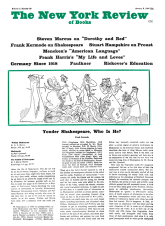One evening recently, while looking for the apartment of friends in a large West Side building, I accidentally entered a wrong door, and so chanced upon a rather curious literary soirée. The guests—middle-aged professorial types for the most part, and women of a clever, brittle stamp—were so absorbed in an entertainment of some kind that they failed to notice my arrival. The room was dead quiet as the assembled guests gazed with breathless intensity at two central figures, one of whom held a large open book in his lap.
“Manny Hughes,” he said then in a voice hushed with drama, and he gave a narrow, searching look to the man sitting opposite—he who quickly lowered his eyes as though hearing a terrible indictment, while the crowd around him murmured enigmatically. This man—whom I recognized, incidentally, as a fairly prominent literary critic—then underwent a metamorphosis before our very eyes. Where a moment previous he had appeared the essence of confidence and savoir-faire, he now seemed to be experiencing the kind of torturous, almost insane, confusion which might accompany the gradual entrance of a marlin-spike through the top of the head.
Here was a sinister business, and one not wholly to my taste.
“What the devil’s going on?” I demanded of a chap nearby.
His answer came in a hiss of admonishment to keep quiet: “Wofpit!”
For the moment I misunderstood his reply, quite naturally I think, to be “Wolf Pit!” So then, here was a sinister business indeed! Wolf Pit! I took a drink to steady myself and cast another glance at the poor wretch in the “Pit” (as I supposed they must call his peculiar status at the moment); his face had gone ashen now and seemed to assume the texture of softening wax. His lips trembled, his teeth chattered, he opened his mouth to speak but the sound was a grotesquely uncertain “aaacchh.” Then, with an effort of will which can only be likened to certain instances of behavior at Dunkirk, his tanned and sensitive hands tightening on the Chippendale armrest to the appearance of white marble, the sinews lacing his neck like pulsating cables, he mastered himself enough at last to speak—in the curious rote of a wooden doll: “Is it…the white night watchman of the mill where Rider works? From Pantaloon in Black? First pub—“ But he broke off abruptly under the contemptuous stare of his tormentor (the “Wolf”) and the sly snickers of several guests.
A tight little smile played at the inquisitor’s lips as he wagged his head with feigned patience. “Hardly,” he said, then read from his big book: “Manny Hughes is the postmaster in Blizzard, Arizona. He makes the letters containing money which Crump sends to the woman at Siugut look as if they come from her husband. From Idyll in the Desert, 1931, limited signed edition of 400 copies. Random House.”
The man in the “Pit” smashed a hand to his brow, as though to punish the brain itself. “Good God, of course!” he cried in high anguish.
This strange “Wolf” and “Pit” exchange recurred a number of times—with “Whiteley,” “Robinson,” “Ffollansbye” (from “Thrift,” Saturday Evening Post Sept. 6, 1930) and “Joe” and “Pete” (from “Once Abroad the Lugger”, Contempo I, Feb. 1932) getting a brisk workout, as well as such more esoteric fare as “Acey,” “Ailanthia,” “Yo Ho,” and “Mrs. Sophie Zilich.”
After a few drinks I was keen to take part, but I had no idea what was going on. It was not until the others went in to dinner that I had opportunity to examine the book itself, and thereby learn what we had been playing was, in fact, the current craze-game “Wofpit” (“W.O.F.P.I.T.”) or “Which Of Faulkner’s People Is It?”—based, of course, on the new Kirk and Klotz giant rule book, Faulkner’s People: A Complete Guide and Index to the Characters in the Fiction of William Faulkner, which “identifies and interrelates the more than 1200 characters in Faulkner’s novels, short stories, and sketches.”
Now by way of spelling this out, what we have here is a 354-page book comprised of 1200 Faulkner-character names. Following each man is a bit of text which attempts to interrelate these characters—curious undertaking since it is (one would have thought) well enough known that Faulkner’s own interest in genealogy was limited to one work at a time. If a particular relationship carried over (or shall we say endured) that was just good gravy. Not until his name achieved its ultimate deadly popularity was there conscious concern (or perhaps infatuation) on his part (and under, one must add, strong publisher pressure) to impose upon these relationships any overall consistency.
Know who “Uncle Alec” was? Hmm? I’m not telling, but I shall be happy to part with my copy (apparently used at only one round of Wofpit) for anything approaching a fraction of its preposterous price.
Advertisement
This Issue
January 9, 1964



